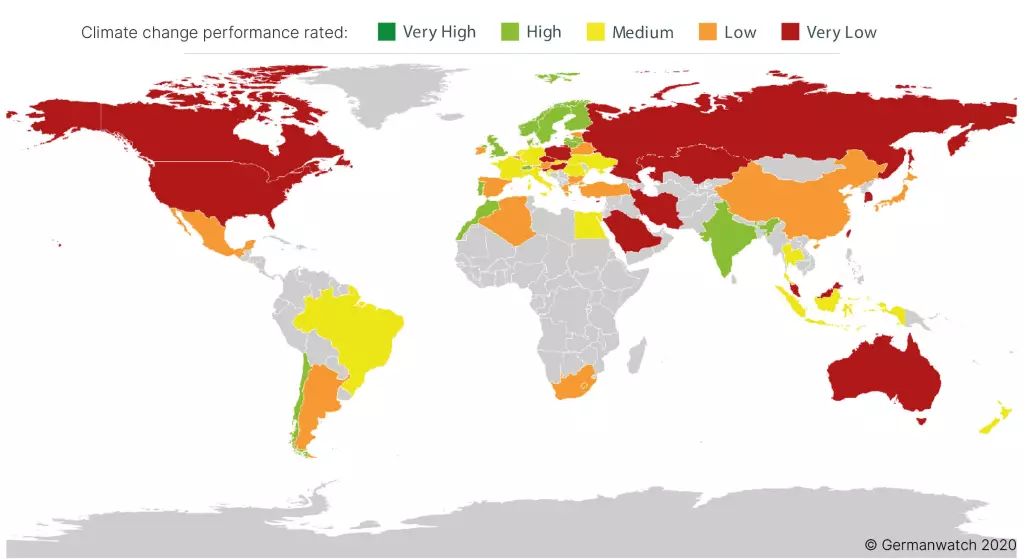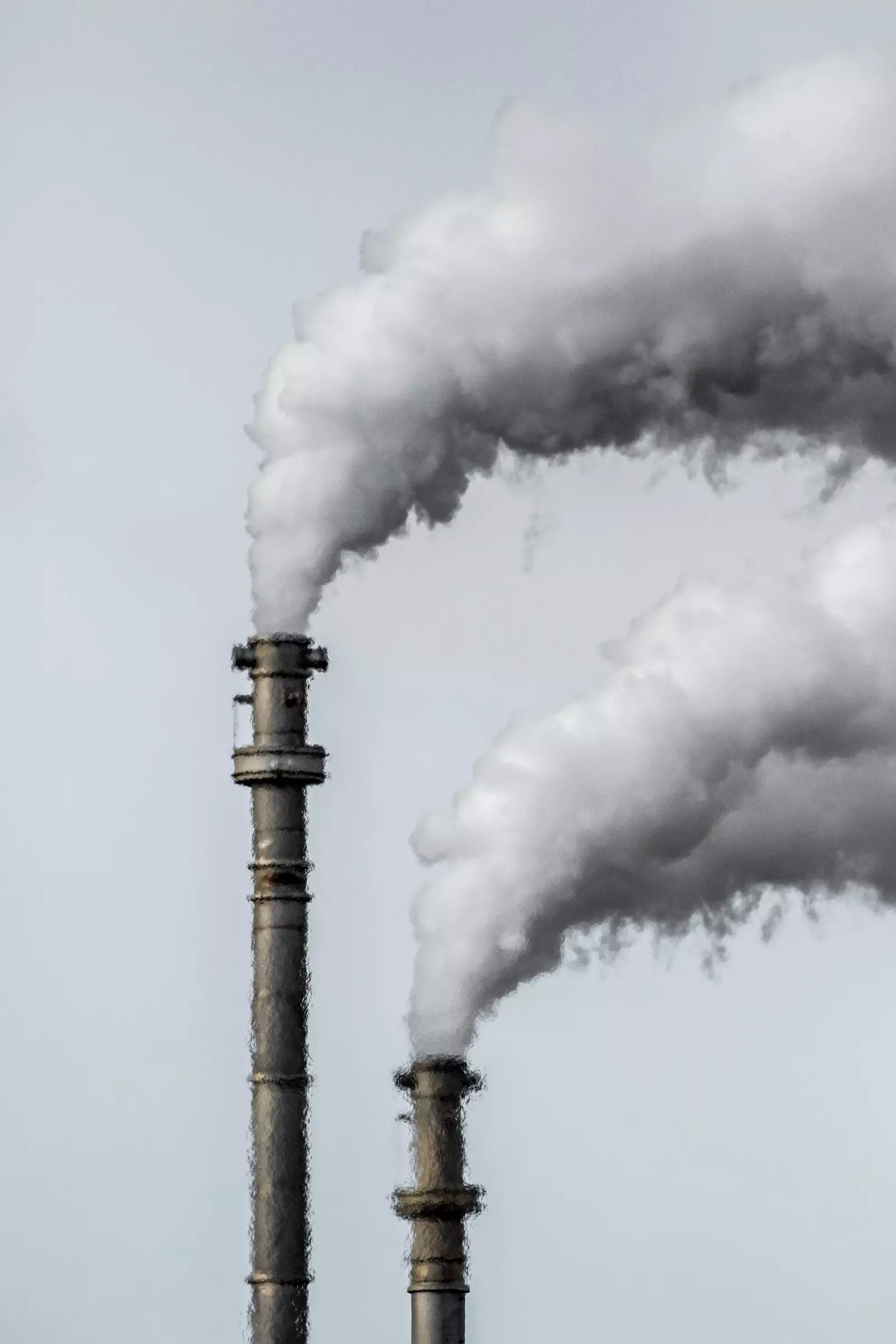
Sweden, the fourth country on a list in which the first three positions are deserted
completely deserted : this is how the first three positions in the ranking of the Climate Change Performance Index (a report that measures the climate change performance Of each country). This means that no country in the world considers itself sufficiently aware of the climate crisis. We fail again, as mankind, to the world: “ None of the countries surveyed are on track to meet the goals of the Paris Agreement”.
The grand conclusion of this year's report leaves a clear message: climate change advances and no country in the world lives up to expectations.
Every year and since 2005, Climate Change Performance Index (CCPI) independently monitors the behavior, policies and measures that 57 countries plus the European Union as a whole carry out, reflecting on their role, the insufficiency or not of these and the general climate panorama. “The CICC aims to improve the transparency of international climate policies and allows the comparison of progress and protection efforts among all countries”, reads the description of the organization itself.

Climate Change Performance Index (CCPI)
METHODOLOGY: WHAT THE CICC MEASURES, AND HOW
The CICC evaluates and compares the performance of climate protection measures in 57 countries and the European Union ( all of them together, account for 90% of the world's greenhouse gas emissions ). The last country added to the study list was Chili , in the 2020 report (published at the end of 2019).This body studies four categories
- Greenhouse gas emissions (being 40% of the score)
- Renewable energies (20%)
- Energy use (20%)
- Environmental policies (20%)
The data is extracted from the International Energy Agency (IEA), PRIMAP, FAO and Greenhouse Gas Inventory United Nations Framework Convention on Climate Change , in addition to the official policies of each country in this regard.
THE GREAT CONCLUSIONS
The only optimistic note in the report is given by the general reading of the greenhouse gas emission , which suffer a notable decline in more than half of the countries studied (in 32 of them, to be exact).
In two thirds of the countries (38) more than 10% of primary energy comes from renewables ; and in 12 of these countries, renewables account for more than 20% of the total.
The European Union
If we focus on Europe, of all the countries analyzed, the European Union as a whole is one of the great beneficiaries in the ranking (goes from rank 22 to 16): seven european countries – and the European Union as a whole – are positioned among the best in the ranking, receiving a high rating in terms of environmental protection policies. But five countries in the European Union are far below expectations . stand out Hungary, Poland and the Czech Republic , three countries that are very far from the climate goals set by the Paris Agreement. In fact, Hungary and Slovenia they remain with the two worst positions in the European Union, improving the position of Poland.Sweden leads the ranking, in fourth position (remember that the first three positions remain empty). Portugal represents the great rise of the year in the list (With New Zealand ), boasting of iron environmental policies. In spite of everything, Sweden is not a climatic model to follow", reads the study. "Like the rest of the countries, is not yet on track to achieve the goals of the Paris Agreement ; on the other hand, Sweden is implementing greenhouse gas emission standards, in renewable and green energy policies...", so it is expected to improve, even more, in the next report.
Jan Burck , one of the authors of the report, focuses on the European Union as a leader in that future hope, as an agent of the global change that is expected: “ The pandemic has shown that the European Union is at a crossroads . It can become a model to follow in terms of environmental protection and recovery policies after the coronavirus crisis, setting an ambitious goal for 2030, in line with the set limit (to avoid global warming greater than 1, 5 ºC) of the European Green Deal. Or, on the contrary, You can reverse this trend if you decide to go down the path of greenwashing instead of a true green recovery.".
The G20 countries
There is no unanimity in the behavior of the G20 countries. The European Union as a whole, India (10th place in the ranking) and the United Kingdom (5th) are the ones that rank better . But the rest of the countries are far from the expected minimum: the United States (61st), Saudi Arabia (60th), Canada (58th), Australia (54th), South Korea (53rd), Russia (52nd), all under the umbrella of the “very low” denomination. None of these countries can be considered to be in line with the provisions of the Paris Agreement. Greenhouse gas emissions have increased slightly, but decreased in most of the countries analyzed.
Dedicating resources and investing in green alternatives, reducing long-term emissions and boosting the economy should be the way. But it remains to be seen which of the two paths the countries of the world choose.
Spain worsens its position
Several countries worsened their position compared to 2019, such is the case of Spain, which falls from position 34 to 41 ; the same happens with Slovenia (from 44 to 51), with Belgium (from 35 to 40), Greece (from 28 to 34). They are the countries that have shown a more pronounced decrease from one year to another in the ranking.The worst positions in the ranking
As to USA , 2020 would be the second consecutive year of descent into the hell of environmental policy, placing it in the worst country on the list, the last in the world. Not in vain, in the studio he stands behind Saudi Arabia , for the first time. Iran would be the third from the bottom of this ranking
This would be, to date, the worst reading of the United States in this report: in three of the four parameters (greenhouse gas emissions, energy use, environmental policies), the country is in the worst assessment ("very low , very low") and moves up one position (to "low", "low") in terms of renewable energy. " President-elect Biden's plans they present a great opportunity to significantly improve the situation; but only if he works, effectively, on what was promised during his election campaign," reads the study.
THE GREAT CONCLUSIONS
The study is not optimistic but leaves room for hope, relying on some of the policies and agreements that countries have promised to fulfill . Most countries have implemented measures targeting economies with a low ecological footprint, however, we cannot say the same about short-term measures on those sectors that produce the most emissions in the world: “ without conditions that force a lower emission, the effect will not be positive”.
The teacher Niklas Höhne of the New Climate Institute , deduces: “It is now, at the most crucial moment, that the world economic recovery must not only p hold revive the economy , but also prepare for a zero carbon economy ’. Most of the policies and actions investigated for this report, to date, cannot be certain whether they will increase or decrease the emission of greenhouse gases. But there's still room for rethink recovery policies and many good measures under discussion”.

Refinery in Woods Cross, United States
